New job, new assignment, new task, or new challenge
exploring the situation then creating a play book and game plan
… try to avoid getting stranded where you don’t want to be …
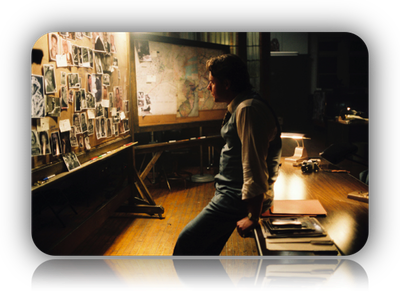
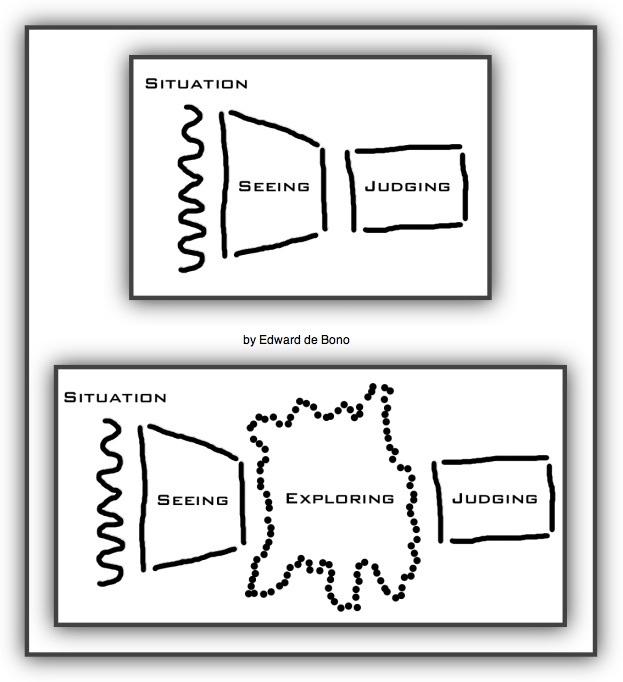
“To know something,
to really understand something important,
one must look at it from sixteen different angles.
People are perceptually slow,
and there is no shortcut to understanding;
it takes a great deal of time.” read more
«§§§»
“Concentration—that is, the courage
to impose on time and events
his [or her] own decision as to what really matters
and comes first—is the executive’s only hope
of becoming the master of time and events
instead of their whipping boy.” PFD
«§§§»
“Managers are synthesizers
who bring resources together
and have that ability to “smell” opportunity and timing.
Today perceptiveness is more important than analysis.
In the new society of organizations,
you need to be able to recognize patterns
to see what is there
rather than what you expect to see.”
— Interview: Post-Capitalist Executive
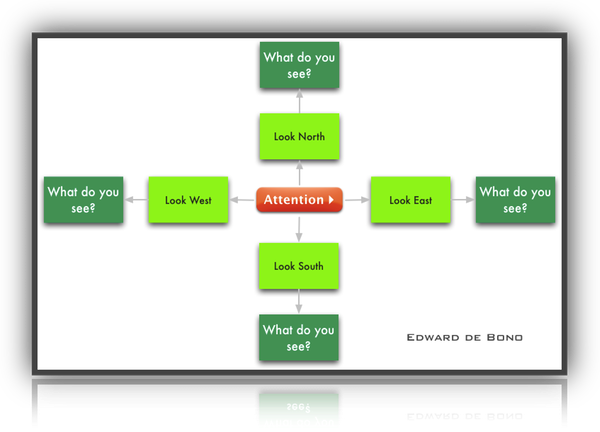
Writing out what you see
is different from saying it
mentally or verbally. It makes you decide.
Additionally, what are the implications of what you see?
Dense reading and Dense listening
Thinking Broad and Thinking Detailed by Edward de Bono
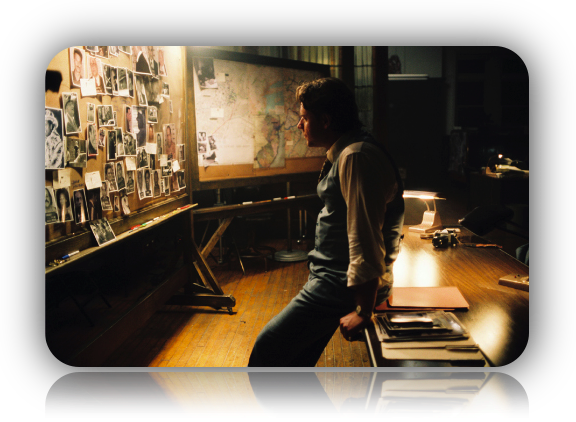
What do these issues, these challenges mean for …
Note the fog and reflection ↓
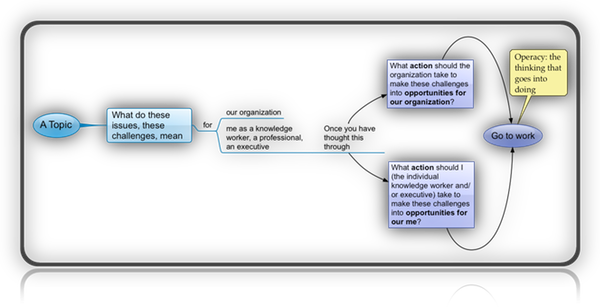
… an alternative
Water logic vs. rock logic
Operacy — the thinking that goes into doing

Quotes from Managing Oneself
The conclusion bears repeating: Do not try to change yourself—you are unlikely to succeed.
But work hard to improve the way you perform.
And try not to take on work you cannot perform or will only perform poorly.
… We will have to learn to develop ourselves.
Will have to place ourselves where we can make the greatest contribution.
And we will have to stay mentally alert and engaged during a 50-year working life, which means knowing how and when to change the work we do.
… Equally important, knowing the answer to these questions enables a person to say to an opportunity, an offer, or an assignment,
“Yes, I will do that.
But this is the way I should be doing it.
This is the way it should be structured.
This is the way the relationships should be.
These are the kind of results you should expect from me, and in this time frame, because this is who I am.”

Where will it lead to and leave you?

 Is there a future job market for it? Is there a future job market for it?
 Resume planning Resume planning
 When Indispensability Is a Career Killer When Indispensability Is a Career Killer

Peter Drucker's: Fifth Experience
My next learning experience came a few years after my experience on the newspaper.
From Frankfurt I moved to London in 1933, first working as a securities analyst in a large insurance company and then, a year later, moving to a small but fast-growing private bank as an economist and the executive secretary to the three senior partners.
One, the founder, was a man in his seventies; the two others were in their midthirties.
At first I worked exclusively with the two younger men, but after I had been with the firm some three months or so, the founder called me into his office and said,
“I didn’t think much of you when you came here and still don’t think much of you, but you are even more stupid than I thought you would be, and much more stupid than you have any right to be.”
Since the two younger partners had been praising me to the skies each day, I was dumbfounded.
And then the old gentlemen said, “I understand you did very good securities analysis at the insurance company.
But if we had wanted you to do securities-analysis work, we would have left you where you were.
You are now the executive secretary to the partners, yet you continue to do securities analysis.
What should you be doing now, to be effective in your new job?“
I was furious, but still I realized that the old man was right.
I totally changed my behavior and my work.
Since then, when I have a new assignment, I ask myself the question,
“What do I need to do, now that I have a new assignment, to be effective?“
Every time, it is something different.
Discovering what it is requires concentration on the things that are crucial to the new challenge, the new job, the new task. (calendarize this?)
“Concentration—that is, the courage
to impose on time and events
his [or her] own decision as to what really matters
and comes first—is the executive’s only hope
of becoming the master of time and events
instead of their whipping boy.” PFD
See “what needs doing?”
Marketing and four entrepreneurial activities
Peter Drucker On Leadership
“Make sure the appointee understands the job” in People Decisions
Managing the boss
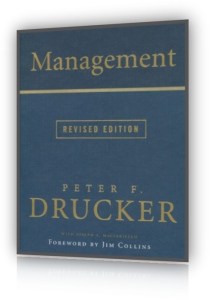 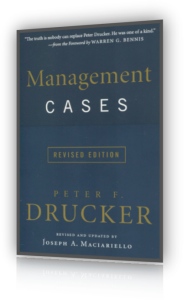
Management, Revised Edition content outline
Amazon Links: Management Rev Ed and Management Cases, Revised Edition and Management Cases, Revised Edition

Promotions: Many people honestly believe that a promotion or change in status instantly and mystically qualifies them to handle any problem that comes their way or that they may seek out.
Nothing could be further from the truth.
A promotion likely to pan out produces temporary incompetence, the kind of awkwardness that always comes before deeper understanding.
The only appropriate response to a promotion is “Good grief, have I got a lot to learn now!” Leadership Jazz by Max De Pree

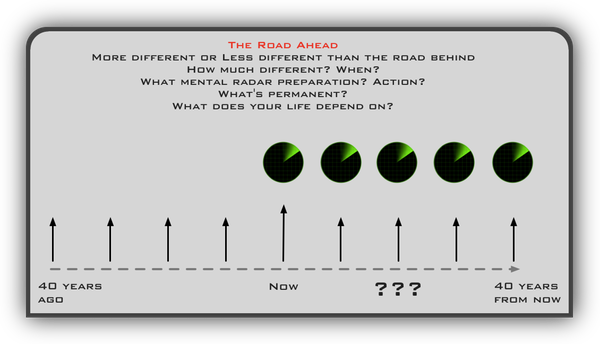
Knowledge — THE resource
the central energy of a modern society
“That knowledge has become the resource,
rather than a resource,
is what makes our society “post-capitalist.”
This fact changes—fundamentally—the structure of society.
It creates new social and economic dynamics.
It creates new politics.
“The post-capitalist society is both
a knowledge society and a society of organizations,
each dependent on the other
and yet each very different in its concepts, views, and values.”
“It is the very nature of knowledge
that it changes fast and
that today’s certainties
will be tomorrow’s absurdities” — Peter Drucker
“The productivity of knowledge is going to be
the determining factor in the competitive position
of a company, an industry, an entire country” — PFD
more
Management and the world's work
A Century of Social Transformation
Knowledge: Its Economics and Productivity
Management’s New Paradigm
The center of modern society is the managed institution
A world organized by information

“Even today, remarkably few Americans are prepared
to select jobs for themselves. When you ask,
“Do you know what you are good at?
Do you know your limitations?”
they look at you with a blank stare.
Or they often respond in terms of subject knowledge,
which is the wrong answer.
When they prepare their resumes,
they still try to list positions like steps up a ladder.
It is time to give up thinking of jobs
or career paths as we once did
and think in terms of taking on assignments
one after the other.”
Interview: Post-Capitalist Executive
«§§§»
Executive Jobs and Growth:
You have to learn to manage in situations
where you don’t have command authority,
where you are neither controlled nor controlling.
That is the fundamental change. Read more


Analysis of the entire business and its basic economics always shows it to be in worse disrepair than anyone expected.
The products everyone boasts of turn out to be yesterday’s breadwinners or investments in managerial ego.
Activities to which no one paid much attention turn out to be major cost centers and so expensive as to endanger the competitive position of the company.
What everyone in the business believes to be quality turns out to have little meaning to the customer.
Important and valuable knowledge either is not applied where it could produce results or produces results no one uses.
I know more than one executive who fervently wished at the end of the analysis that he could forget all he had learned and go back to the old days of the “rat race” when “sufficient unto the day was the crisis thereof.”
But precisely because there are so many different areas of importance, the day-by-day method of management is inadequate even in the smallest and simplest business.
Because deterioration is what happens normally—that is, unless somebody counteracts it—there is need for a systematic and purposeful program.
There is need to reduce the almost limitless possible tasks to a manageable number.
There is need to concentrate scarce resources on the greatest opportunities and results.
There is need to do the few right things and do them with excellence.
Managing for Results by Peter Drucker
Broken Washroom Doors: Drucker said the problem of having people in positions where they do the least amount of good exists everywhere, but it is more rampant in hospitals, churches, and other nonprofits than in corporations.
To raise productivity in most any organization managers should regularly assess their key people, their strengths, and the results they achieve.
Then they should ask themselves:
Do we have the right people in the right jobs, where they can make the greatest contributions?
Are the jobs the right ones, meaning do we have people performing tasks that even if achieved do not add value to the organization?
What changes in people, jobs, and job functions can we make that will yield greater results?
Inside Drucker's Brain
The 90/10 Rule at Yum! Brands
But every analysis of actual allocation of resources and efforts in business that I have ever seen or made showed clearly that the bulk of time, work, attention, and money first goes to 'problems' rather than to opportunities, and, secondly, to areas where even extraordinarily successful performance will have minimal impact on results. (calendarize this?)
One of the hardest things for a manager to remember is that of the 1,000 different situations he or she will be asked to deal with on any given day, only the smallest handful have a shot at moving the enterprise forward in a truly significant way (calendarize this?)
The job of management, then, is to make sure that financial capital, technology, and top talent are deployed where most of the results are and where most of the costs aren't. The temptation often exists, however, to do exactly the opposite
High tech is living in the nineteenth century, the pre-management world. They believe that people pay for technology. They have a romance with technology. But people don't pay for technology: they pay for what they get out of technology. The Frontiers of Management
 What Everybody Knows Is Frequently Wrong What Everybody Knows Is Frequently Wrong
 Approach Problems with Your Ignorance — Not Your Experience Approach Problems with Your Ignorance — Not Your Experience
 Abandonment Abandonment
 What do I know, what have I learned, that might apply to this task? What do I know, what have I learned, that might apply to this task?
 Continuous learning Continuous learning
 Base Your Strategy on the Situation, Not on a Formula (chapter in A Class With Drucker: The Lost Lessons of the World’s Greatest Management Teacher Base Your Strategy on the Situation, Not on a Formula (chapter in A Class With Drucker: The Lost Lessons of the World’s Greatest Management Teacher
 What executives should remember What executives should remember
 Strengths are the true opportunities Strengths are the true opportunities
 Drucker Time Books Drucker Time Books
 A much broader landscape A much broader landscape

The Effective Executive Preface
(What needs doing?)
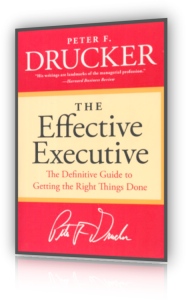
Amazon Link: The Effective Executive: The Definitive Guide to Getting the Right Things Done (Harperbusiness Essentials)

The First 90 Days: Critical Success Strategies for New Leaders at All Levels—content outline
(nobody could really do all of this)
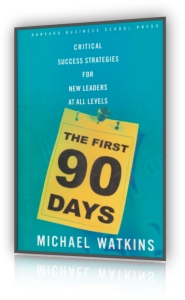
Amazon link: The First 90 Days: Critical Success Strategies for New Leaders at All Levels
“Promoting yourself” does not mean self-serving grandstanding or hiring a PR firm.
It means preparing yourself mentally to move into your new role by letting go of the past and embracing the imperatives of the new situation to give yourself a running start.
This can be hard work, but it is essential that you do it.
All too often, promising managers get promoted but fail to promote themselves by undertaking the necessary change in perspective.
A related mistake is to believe that you will be successful in your new job by continuing to do what you did in your previous job, only more so.
“They put me in the job because of my skills and accomplishments,” the reasoning goes.
“So that must be what they expect me to do here.”
This thinking is destructive because doing what you know how to do and avoiding what you don’t can appear to work, at least for a while.
You can exist in a state of denial, believing that because you are being productive and efficient, you are being effective.
You may keep on believing this until the moment the walls come crashing down around you.
The First 90 Days: Critical Success Strategies for New Leaders at All Levels by Michael Watkins
Find “levels” in information literacy

What Got You Here Won't Get You There (content outline) by Marshall Goldsmith
(work place behaviors to avoid)

Amazon Link: What Got You Here Won't Get You There: How Successful People Become Even More Successful

Just reading is not enough
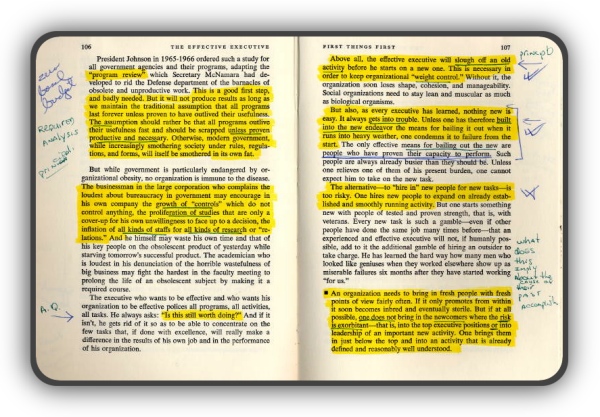
Harvesting and action thinking are needed …
… read about it here


What do you want to be remembered for?
rlaexp.com key entry points: smaller, big picture thinkscape ::: leader entry ::: board ::: new job ::: career work plan development ::: knowledge specialty ::: economic development ::: over 500 inter-linked pages — “brainroadS toward tomorrowS” © “organization evolution” © “career evolution” © “foundations for future directed decisions” ©
Keywords: tlnkwnewjob
rlaexp.com’s purpose is to provide a big picture thinking landscape for navigating our changing world — a world in profound transition.
There are 500+ pages inter-weaving management, leadership, organization evolution, the evolving content and structure of society, knowledge, technology, career evolution, education, learning, marketing, production, innovation, entrepreneurship, thinking, software tools, information challenges, concepts to daily action … through time. Any time someone is engaged in decision thinking they need a “foundation for future directed decisions.” ©
rlaexp.com is largely inspired by the work of Peter Drucker and a few others.
The site provides a “menu” for identifying important “things” to work toward that largely go unseen.
We can only work on, with and toward the “things” on our active “mental radar.”

In a changing world, we need a way to repeatedly look beyond current mental involvements.
We need a way to think about things we aren’t already thinking about at multiple points in time. Waiting for a crisis is one way to accomplish this, but surely there are better ways.
rlaexp.com’s uniquely broad landscape is designed to meet this challenge.
TomorrowS can’t be reached by today’s activities or thinking. Examples constantly flow through the news.
Who in 1950, 1970, 1990, 2000 … had an adequate future facing radar?
Why would today be any different?
Where and how we spend our time matters — a world in constant flux.
I’m trying to provide this exploration and thinking landscape to help people figure out what to do as we move deeper into the 21st century: a knowledge society, a society of organizations, and a network society.
America’s future depends on this awareness, ability and effective action.
It depends on younger generations having access to this dynamic type thinking and doing something effective. rlaexp.com provides the access and a work approach model.
Just about everybody enters the world of work through known, routine, day-to-day operating work at a point in time. It never seems to occur to nearly anybody that there could be anything else. How could we ever acquire a strategic, dynamic worldview from our beginning vantage points?
Pretending that tomorrow is going to be like yesterday is damaging.
Everybody has a vested interest in this.
For the site to remain available your support is needed. Your support helps with the books, software, web site hosting, and the time devoted to publicizing and enhancing the work approach available on rlaexp.com.
Who do you know that might be interested in working with me on spreading site usage and enhancement?
For the right kind of people, rlaexp.com provides the elements of a future facing consulting or mentoring practice. Contact info is near the bottom of most pages.



To create a rlaexp.com site search, go to Google’s site ↓
Type the following in their search box ↓
your search text site:rlaexp.com


Copyright 1985 through 2023 © All rights reserved | bobembry bobembryusa bobembry.usa | bob embry robert embry | “time life navigation” © #TimeLifeNavigation | “life TIME investment system” © #LifeTimeInvestmentSystem | “career evolution” © #CareerEvolution | “work-life horizons” © | “work-life evolution” © | “life design” © #LifeDesign | “organization evolution” © | #OrganizationEvolution | “brainroads toward tomorrows” © | #BrainroadsTowardTomorrows | “foundations for future directed decisions” © | #FoundationsForFutureDirectedDecisions | #rlaexpdotcom © | rlaexpdotcom ©
#rlaexp.com = rla + exp = real life adventures + exploration or explored
exploration leads to explored
Examples ↑ can be found through web searches, Wikipedia,
Pinterest and the daily news
|
![]()
